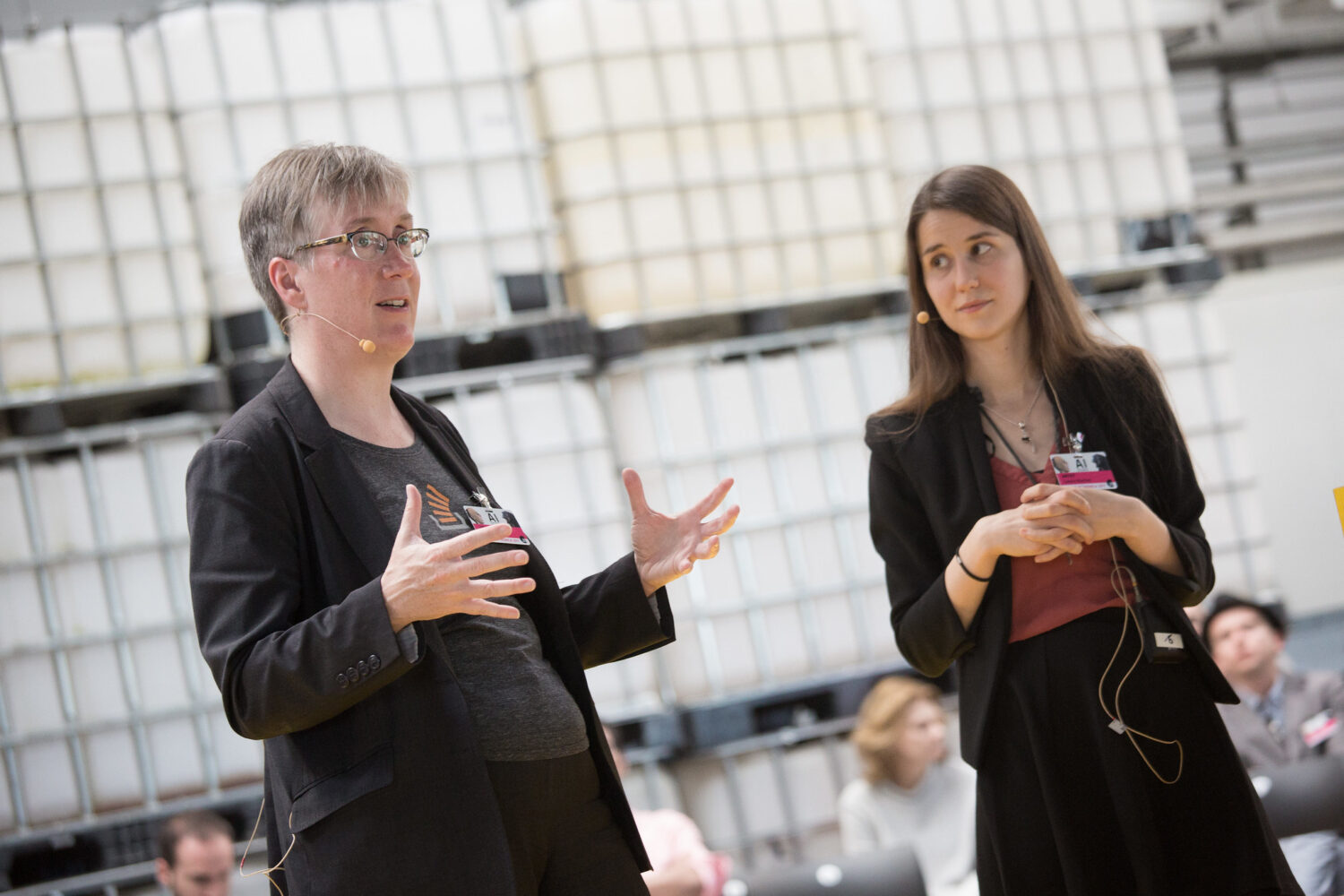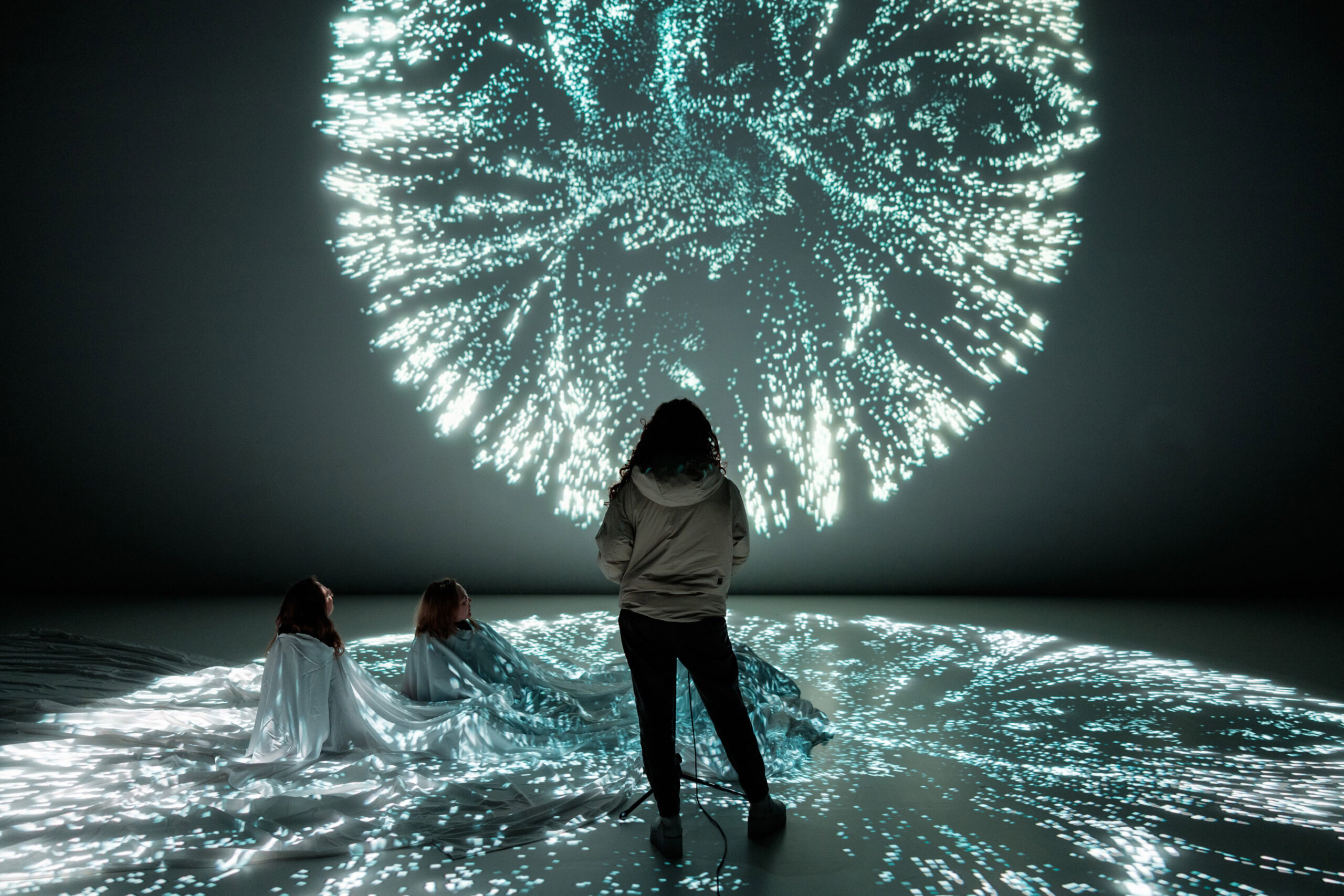The IT:U programme of the Ars Electronica Festival 2024 addresses societal challenges through interdisciplinary innovation, bringing together experts from a variety of fields, including technology, art, science and design, to work together on effective solutions.
As part of the Ars Electronica Festival, which this year is dedicated to the topic of “HOPE–who will turn the tide”, the IT:U-Interdisciplinary Transformation University Austria is dedicated to exploring the connection between social challenges and innovative digital technologies. The focus is on medicine and health, viewed from the different perspectives of the various specialist areas. As a joint project of the IT:U – Interdisciplinary Transformation University Austria and Ars Electronica, the FOUNDING LAB was set up last year as an innovation laboratory at the IT:U. This year’s Ars Electronica Festival not only showcases five different projects by students, but also provides insights into the transformative role of artificial intelligence in higher education with the FOUNDING LAB Day on 4 September, which includes various lectures and talks.

Innovative projects for the digital future
The IT:U FOUNDING LAB, which was launched in 2023 with a summer school followed by an autumn and spring semester, is now taking six outstanding students from its first generation to the Ars Electronica Exhibition 2024 to present their final projects.
The five projects by the six IT:U FOUNDING LAB students from the UK, Austria, India, Australia, Japan and Canada address a wide range of social issues – from virtual reality experiences for people with disabilities, health monitoring using machine learning and artistic innovation, the revival of dreams through cutting-edge VR, the combination of AI-generated images with historical texts that reveal surprising parallels, and finally, questioning our social vision of care and how we want to integrate it into our technologies.
Developed in collaboration with dream researchers, the “ReVerie” AI system addresses the potential misuse of dream technologies by allowing participants to relive and reinterpret their dreams. This interactive installation involves a ritual in which participants whisper their dream objects, which are then brought to life in a shared immersive space by a generative diffusion AI model. This process allows each person to relive their dreams and regain control over unconscious narratives. By exploring the transformative potential of dream reliving, ReVerie makes the hidden dreamscape visible and promotes an approach that empowers dreaming through human-AI collaboration to prevent a future in which dreams are commodified and weaponised.

“GPT 1400: The AI Apothecary” imagines what it would have been like if people in the Middle Ages had access to artificial intelligence, and asks whether it would have made a difference. This speculative historical experiment highlights the similarities between AI systems and the pre-scientific physicians of Western Europe, who both relied on ancient texts to create remedies without critical thinking. Visitors select a medieval symptom on tablets and prompt the AI to generate a unique response and prescription based on historical texts. The results are displayed in a recreated consulting room with hybrid AI/medieval botanical illustrations and a puppet dressed as a plague doctor. This immersive experience critiques the limitations of AI and encourages reflection on knowledge and critical thinking across time.

Focusing on contemporary social challenges, “Reassembling Bolts of Care” explores the complex role of care in both promoting solidarity and maintaining capitalist society. This robotic performance lecture explores the tensions between care as an exploited resource and the emerging market for robotic care. The performance combines pre-recorded videos of robot-assisted interactions with live theatre scenes that incorporate narrative and personal biographical elements. It showcases different robots designed for care and invites the audience to reflect on how we care for and maintain these technologies. Through this experience, the project challenges conventional definitions of care embedded in robotic technologies and advocates a re-evaluation of our ethical and relational approaches to these advances.

In the field of assistive technologies, “Crip Sensorama” is a multi-sensory, interactive XR experience that allows participants to move, navigate and interact in VR/AR environments using mouth gestures. This project enables people with physical disabilities to control their movements and interactions in XR using chin, jaw and lip gestures. Designed to challenge normative assumptions about disability, Crip Sensorama showcases the artistic practices of disabled artist Eric Desrosiers. By hacking existing AI facial recognition algorithms and modifying lip and face recognition systems, the project creates an accessible platform for Eric to use his mouth and tongue movements to interact with XR. This innovative approach demonstrates how assistive XR technologies can be repurposed as platforms for storytelling by and for people with disabilities, to promote a deeper understanding and appreciation of the arts and culture of people with disabilities.

Finally, “Do Algorithms Care?”, a collaborative project between artist Amanda Bennetts and data scientist Johanna Einsiedler, critically examines the commercialisation of personal biological data. The installation, which resembles a technology store, uses self-built smartwatches and an interactive data interface to explore how personal data and machine learning can predict well-being. The project is based on an open source philosophy, providing all the code, smartwatch designs and processes to encourage the democratisation and critique of technology. Visitors interact with the smartwatches, sensor kits and visual data displays, initiating discussions about the ethical and political implications of biometric data. The installation promotes a deeper understanding of the risks associated with the use and control of personal data and encourages visitors to rethink their relationship to privacy and data control.
Open Research & Education
The FOUNDING LAB Day on 4 September as part of the Ars Electronica Festival 2024 offers an insight into the transformative role of artificial intelligence in higher education. The conference brings together leading researchers, academics and practitioners to discuss and exchange insights on transdisciplinary AI education and research. This year’s conference aims to build on the foundations laid in 2023, highlight current practices and stimulate international discussions that could shape the future of AI in education.
The conference will open with a keynote address on artificial intelligence by Joanna Bryson. Joanna Bryson is a professor of ethics and technology at the Hertie School, and her research focuses on the impact of technology on human cooperation and AI/ITT governance. She was a guest at the Ars Electronica Festival in 2020. In the following conference “Get.Inspired – Interdisciplinary and practice-based learning”, Andreas Ingerl, Professor of Audiovisual Media at the Berlin University of Applied Sciences, Laura Veart, International Programme Manager at STEAMhouse, and artist Qian Ye will discuss interdisciplinary practices in higher education based on a specific teaching project. The subsequent panel, “The Future of Open Research and Practice-Based Learning”, will discuss how open research from different fields (research, education, art) can be promoted and what benefits this has for research, the labour market and society.

The conference provides a platform for experts from different universities and disciplines to share valuable insights into their current approaches and strategies for transdisciplinary and practice-oriented learning. Participants will have the opportunity to network with peers, share educational experiences and discuss innovative ideas. The FOUNDING LAB Day offers a unique opportunity to engage with thought leaders, explore innovative educational practices and contribute to the advancement of AI in higher education. The conference promises to be a catalyst for collaboration and innovation, addressing the critical intersections between AI and academia.
The students’ projects will be on display at POSTCITY from 4 to 8 September as part of the Ars Electronica Festival 2024. The FOUNDING LAB Day will take place on 4 September from 2 to 5 pm on the Conference Stage at POSTCITY. Tickets for the festival can be purchased here.
